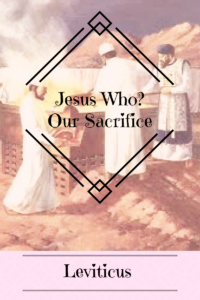This week we are studying Leviticus and Jesus as our Sacrifice, as we continue the series, Jesus Who? Last week we studied Genesis and got to know the Jesus of Genesis. He was part of the Trinity, the Godhead and the seed of the woman. In studying Exodus, we were introduced to Jesus, our Passover Lamb. In the book of Leviticus, Jesus can be seen in the sacrificial offerings and the priesthood, and the feast days (Find out more about the Feasts of the Lord here). I will briefly touch on the sacrificial offerings.
 The book of Exodus ends with where God desires to be worshiped (tabernacle) and the book of Leviticus begins with how God wants to be worshiped (sacrificial system). Leviticus derives its name from the tribe of Levi, those chosen as priests by God. The original name for this book was Wayyiqra, is the first word in the Hebrew text of the book and means “And he [i.e., the Lord] called” (Leviticus 1:1: Now the Lord called to Moses, and spoke to him from the tabernacle of meeting). The main theme of Leviticus is holiness; this word is used 87 times in the book. Key holiness verses from Leviticus include Leviticus 11:44-45, 19:2, and 20:7 (You shall be holy, for I the Lord your God am holy.) It is the sacrifice of the Lord Jesus that makes us holy. We were washed in His blood and cleansed from our sinful nature. The Old Testament sacrifices foreshadow the great sacrifice Jesus made for us, thus there is a direct correlation between the book of Leviticus and the New Testament book of Hebrews. In the Old Testament, the sacrifice was a way to have a relationship with God; in the New Testament, Jesus is that sacrifice (relationship).
The book of Exodus ends with where God desires to be worshiped (tabernacle) and the book of Leviticus begins with how God wants to be worshiped (sacrificial system). Leviticus derives its name from the tribe of Levi, those chosen as priests by God. The original name for this book was Wayyiqra, is the first word in the Hebrew text of the book and means “And he [i.e., the Lord] called” (Leviticus 1:1: Now the Lord called to Moses, and spoke to him from the tabernacle of meeting). The main theme of Leviticus is holiness; this word is used 87 times in the book. Key holiness verses from Leviticus include Leviticus 11:44-45, 19:2, and 20:7 (You shall be holy, for I the Lord your God am holy.) It is the sacrifice of the Lord Jesus that makes us holy. We were washed in His blood and cleansed from our sinful nature. The Old Testament sacrifices foreshadow the great sacrifice Jesus made for us, thus there is a direct correlation between the book of Leviticus and the New Testament book of Hebrews. In the Old Testament, the sacrifice was a way to have a relationship with God; in the New Testament, Jesus is that sacrifice (relationship).
Leviticus 17:11 AMP: For the life is in the blood, and I have given it for you upon the altar to make atonement for your souls; for it is the blood that makes atonement, by reason of the life [which it represents].
Hebrews 8:7 AMP: For if that first covenant had been faultless, there would have been no occasion for a second one or an attempt to institute another one [the new covenant].
Hebrews 9:22 AMP: In fact under the Law, almost everything is cleansed with blood, and without the shedding of blood there is no forgiveness [neither release from sin and its guilt, nor cancellation of the merited punishment].
Hebrews 9:13-15 AMP: For if [the mere] sprinkling of unholy and defiled persons with blood of goats and bulls and with the ashes of a burnt heifer is sufficient for the purification of the body; how much more surely shall the blood of Christ, Who by virtue of [His] eternal Spirit [His own pre-existent divine personality] has offered Himself as an unblemished sacrifice to God, purify our consciences from dead works and lifeless observances to serve the [ever] living God? [Christ, the Messiah] is therefore the Negotiator and Mediator of an [entirely] new agreement (testament, covenant), so that those who are called and offered it may receive the fulfillment of the promised everlasting inheritance—since a death has taken place which rescues and delivers and redeems them from the transgressions committed under the [old] first agreement.
Throughout the book of Leviticus, there is a recurring theme of how to find redemption through sacrifice, showing us a perfect picture of Jesus as our true sin offering. Have you met the Jesus of Leviticus? The Day of Atonement (Yom Kippur) draws near (September 30, 2017). If you have not been born again, make today your day of atonement. You can find more information about the Jesus of Leviticus here.
Disclosure: Many of the linked products and services I recommend are affiliate links, which means I may receive a small commission at no additional cost to you. As an Amazon Associate, I earn from qualifying purchases.
 tailored to align
tailored to align 